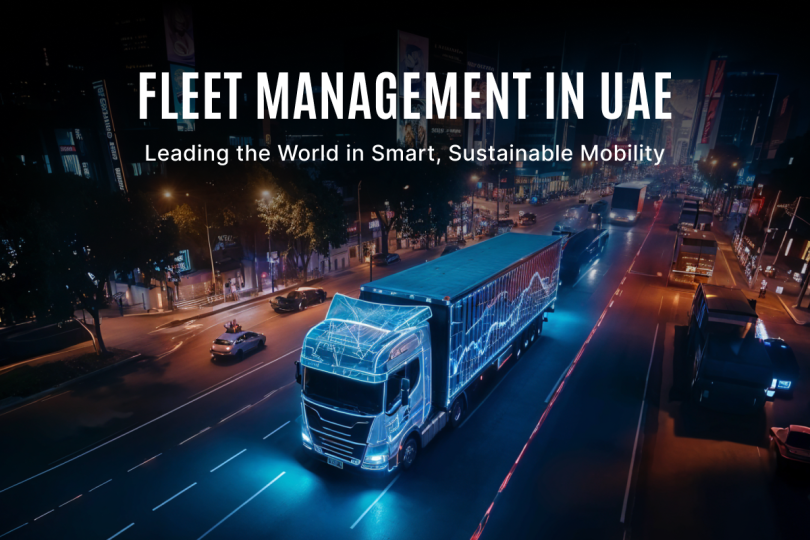The UAE is not just adapting to smart mobility—it’s leading the way. From driverless taxis to AI-enabled traffic systems, the country has become a global benchmark in transport innovation. In line with its UAE Vision 2030, smart fleet solutions are now at the core of how vehicles are managed, monitored, and optimized across industries.
Unlike many regions where digital fleet adoption is reactive, fleet management in UAE is proactive and forward-thinking. Businesses here are embracing technology not only to cut costs but also to stay ahead of regulations, meet sustainability goals, and offer world-class services.
Leading by Example: UAE’s National Vision Supports Smart Fleets
The UAE’s leadership in transport tech stems from its clear national goals. Through Dubai’s Smart City initiatives and Abu Dhabi’s green mobility targets, the government is actively encouraging private and public sector fleets to adopt smart solutions.
Fleet operators are aligning with this vision by investing in tools like AI-powered route planning, real-time GPS tracking, fuel optimization, and driver behavior analytics. These technologies are no longer just operational tools—they’re part of a broader push toward sustainability, safety, and efficiency.
Compliance as a Catalyst, Not a Barrier
One unique aspect of fleet management in UAE is how compliance drives innovation. Agencies like the RTA (Roads and Transport Authority) have strict guidelines for fleet behavior, route monitoring, and emissions. Instead of seeing these rules as challenges, UAE fleet operators use them as motivators to digitize faster.
With smart fleet software, businesses can automatically generate compliance reports, track driver behavior in real time, and adjust operations based on regulation updates. These features make it easier for companies to meet rules without disrupting workflow.
Fleets That Think for Themselves: The Role of AI and Automation
UAE businesses are now turning to predictive analytics and AI-driven insights to make faster decisions. Modern fleet software doesn’t just show vehicle location—it helps forecast maintenance needs, suggest fuel-efficient routes, and highlight driver performance trends.
In a highly competitive landscape, these capabilities offer a real advantage. Fleet managers can move from reactive problem-solving to data-backed strategic planning, improving delivery speed, customer satisfaction, and cost control.
Electric and Sustainable: Fleets for the Future
Sustainability is not just a buzzword in the UAE—it’s a key policy direction. The UAE Net Zero 2050 strategy has placed pressure on all sectors, including transportation, to reduce emissions and improve environmental performance.
Fleet management tools now support EV integration, allowing companies to monitor battery health, range efficiency, and energy usage. This visibility is crucial for businesses transitioning to eco-friendly fleets, as it ensures smooth performance and reduces operational uncertainty.
UAE’s Industry-Wide Adoption of Fleet Technology
What sets the UAE apart is the diverse range of industries using fleet software effectively—each with unique requirements and powerful features to match.
1. Luxury and Ride-Hailing Services
In premium ride services, where customer experience is everything, your software offers:
- Real-time GPS tracking for accurate trip monitoring
- Driver behavior monitoring to ensure safe and professional driving
- Live ETA sharing to keep clients informed
- Trip history and performance reports for service quality assessment
- Custom alerts for over-speeding or off-route driving
These tools help operators maintain luxury standards, ensure safety, and optimize dispatching in busy cities like Dubai and Abu Dhabi.
2. Logistics and Cold Chain
For temperature-sensitive transport—especially pharmaceuticals and food—your platform enables:
- Temperature monitoring sensors with live dashboards
- Instant alerts for any temperature fluctuations
- Geofencing to track cold storage arrival and departure
- Fuel monitoring to prevent wastage and reduce costs
- Route optimization to ensure timely deliveries in traffic-heavy zones
These features help logistics providers maintain regulatory compliance and protect cargo quality in harsh UAE conditions.
3. Construction and Infrastructure
Heavy-duty fleet operations in UAE construction projects require durability, uptime, and oversight. Your software supports them with:
- Vehicle health diagnostics for early issue detection
- Maintenance reminders based on engine hours or mileage
- Fuel usage tracking to cut down on idle consumption
- Asset utilization reports to ensure equipment is fully used
- Driver behavior tracking for safety in high-risk areas
These tools help construction firms reduce downtime, maintain safety standards, and improve ROI on high-value assets.
Custom-Fit Solutions: Tech That Speaks the UAE’s Language
Fleet management in UAE isn’t a one-size-fits-all model. Leading providers offer systems tailored for bilingual use (Arabic and English), regional regulations, and sector-specific dashboards.
From Dubai’s dense traffic zones to remote logistics corridors in Sharjah, businesses need flexible systems that adjust to changing conditions in real time. The best fleet solutions offer custom alerts, integration with ERP systems, and smart notifications for decision-makers.
 Conclusion
Conclusion
The UAE is setting a new standard for how fleets should be managed. With government-backed initiatives, tech-forward businesses, and a commitment to sustainability, fleet management in UAE is a case study in smart mobility done right.
Companies operating here are not just saving money—they’re shaping the future of transport. By investing in smart fleet solutions, they’re gaining control, ensuring compliance, and making daily operations smoother and smarter.





